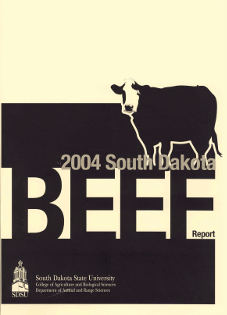Document Type
Report
Report Number
2004-6
Publication Date
2004
Summary
Previous results have shown that water with elevated total dissolved solids (TDS) and sulfates was detrimental to performance of growing steers. The objective of this study was to determine finishing performance of steers that had previously received different levels of water quality during the growing period. In yr 1, 78 steers (824 lb) were assigned to one of eight pens (2-4 pens/treatment) based on water supplied during the 84-d growing period. Water TDS and sulfates during growing were: 1) 1,020 and 400; 2) 4,840 and 3,090; and 3) 6,190 and 3,950 ppm of TDS and sulfates, respectively. In yr 2, 75 steers (840 lb) that were previously supplied water during a 104-d growing period averaging: 1) 1,230 and 440; 2) 2,930 and 1,730; 3) 4,720 and 2,920; and 4) 7,270 and 4,650 ppm of TDS and sulfates respectively, were received and fed in one pen. In both years, all steers were fed a common finishing diet and had access to rural water. In yr 1, steers receiving treatment 1 had higher (P < 0.10) ADG and DMI compared to treatments 2 and 3 during the previous growing period. During the initial 28-d of finishing, treatments 2 and 3 had higher (P < 0.10) ADG than treatment 1. Steer DMI was not different (P = 0.19) between treatments during the first 28-d. Over the entire 126-d finishing trial, ADG, DMI and carcass characteristics were not different due to treatment (P > 0.10). In yr 2, there was a quadratic decline in ADG with increasing TDS (P < 0.05) during the previous growing phase, resulting in treatment 4 have lower initial weight (P < 0.05) compared to treatments 1, 2, and 3. During the first 28-d of finishing, ADG was higher (P < 0.10) for treatments 2 and 3 compared to 1, with treatment 4 being intermediate. Over the 133-d finishing trial, ADG of treatments 2 and 3 was greater (P < 0.10) than treatment 1, with treatment 4 being intermediate, resulting in treatment 4 having lower carcass weight (P < 0.05) compared to treatments 1, 2 and 3. Other carcass traits were not significantly different due to treatment. Steers receiving water during the growing period with 5000 ppm TDS and 3000 ppm sulfates or less were able to compensate for lost growing performance during the finishing period.
Number of Pages
5
Format
application/pdf
Language
en
Publisher
South Dakota State University
Rights
Copyright © 2004 South Dakota State University
Recommended Citation
Tjardes, Kent E.; Patterson, Hubert H.; Wright, Cody L.; and Rops, Bradley D., "Effects of Supplying Water with Varying Levels of Total Dissolved Solids and Sulfates to Steers During the Growing Period on Subsequent Finishing Performance" (2004). South Dakota Beef Report, 2004. 7.
https://openprairie.sdstate.edu/sd_beefreport_2004/7

